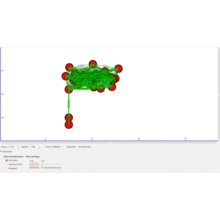Category Archive: 'B.Tech Projects in NS3'
The increased popularity of wireless networks has enabled the development of Location Based Service (LBS) techniques that rely on wireless signal strength. These techniques are being used extensively in military, healthcare, industrial and other environments in Wireless Sensor Networks (WSNs) and Mobile Ad hoc Networks (MANETs). In some networks, it is important to keep track […]
In mobile ad-hoc networks (MANETs), there are selfish nodes, which drop the received data packets, because nodes have limits of their resources. Secure routing protocols are developed as one of security mechanisms. In secure routing, each node can detect selfish nodes and decide secure paths by consulting trust values. Here, trust values express reliability for […]
The use of directional antennae in ad hoc networks can provide high spatial reuse of spectrum and antenna gains. However, employment of directional antennae poses great challenges such as hidden terminal and deafness problems. The existing directional medium access control (DMAC) protocols usually work in a switching mode of omnidirectional listening and directional sending, which, […]
Security is the main concern in today’s wireless network environment. However, cipher algorithms consume a lot of resources to provide the required confidentiality. Ad-Hoc wireless networks are one area where the devices are extremely resource constrained. Therefore computationally simple yet cryptographically strong cipher algorithms are required for such kind of networks. In this paper a […]
With the advent of wireless communication networks and the new generation of smartphones, the access to data transmission networks has become possible anywhere at any time. Today, a group of users can gather in a dynamic manner and set up their own ad hoc communication networks and share geolocalization information thought Global Position System (GPS). […]
Mobile Adhoc networks are gaining popularity in today’s dynamic environment. These are characterized by high mobility, infrastructureless, self organizing, quick deployability and resource constrained networks. The network depends on cooperation among nodes for any communication. High mobility and dynamic architecture of mobile adhoc network make it vulnerable to security issues. Trust plays an important role […]
A broadcast operation is the fundamental transmission technique in mobile ad-hoc networks (MANETs). Because a broadcast operation can cause a broadcast storm, only selected forwarding nodes have the right to rebroadcast a broadcast message among the one-hop and two-hop neighboring nodes of a sender. This paper proposes a novel algorithm to minimize broadcasting redundancy in […]
Existing narrowband mobile ad-hoc networks (MANETs) used in disaster search and rescue (SAR) missions and tactical communications are specifically designed to enable robust unicast or broadcast voice communications. The increasing demand for add-on data services such as messaging, file and map transfer etc requires those long-range communication systems to provide higher data rates while maintaining […]
Virtual warning system which is an integral component of Intelligent Transportation System (ITS) can be realized through geocasting in vehicular ad-hoc networks (VANETs). It enhances road safety and security by targeting a group of vehicles within a specified geospatial region, called Zone of Interest (ZOI) rather than an individual vehicle. Velocity of the node and […]
Delay Tolerant Networks (DTNs) are sparse mobile ad-hoc networks in which there is typically no complete path between the source and destination. Multicast is an important group communication paradigm that is required by many potential DTN applications, such as data dissemination during military and rescue operations. While multicasting has been studied extensively in the context […]

 Click Here to watch our latest output video using NS3 simulator
Click Here to watch our latest output video using NS3 simulator  Click Here to watch our latest projects screenshots using NS3 simulator
Click Here to watch our latest projects screenshots using NS3 simulator